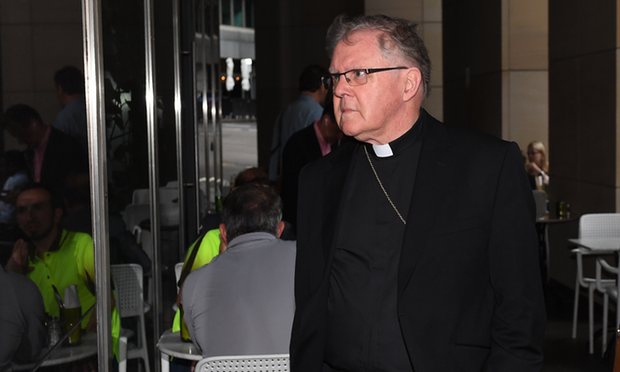Catholic Archbishop Tells Abuse Inquiry Celibacy Vows Are Not to Blame
By Christopher Knaus
The archbishop of Brisbane, Mark Coleridge, has said he does not believe that celibacy is a causative factor in child sexual abuse within the Catholic church. Coleridge has also said he has little idea how many priests are breaking their vows to celibacy and believes that he, as a bishop, has no right to ask them about their sexual lives. “The relationship between a bishop and a priest, or a bishop and any other human being, is a very delicate one,” he said. “There are certain things that I am not entitled to know. I’m just trying to even imagine how that would work out practically, how I would discover the details of a priest’s sexual life?” The issue of celibacy again came before the royal commission into institutional responses to child sexual abuse on Wednesday, as commissioners attempt to understand the root cultural causes that allowed child abuse to occur and be covered up at such a staggering scale. It heard from a panel of experts on Wednesday morning, including the University of Sydney law professor Patrick Parkinson. Parkinson said he believed that the combination of celibacy and emotional isolation among clergy was a causative factor in child abuse. “The combination of mandatory celibacy – and unchosen celibacy really for many priests and religious – combined with the emotional isolation of being in the position of pastoral responsibility that they have, is I think causative,” Parkinson said. “I think it explains some of the shocking figures that we’ve heard, it explains the increased risk, which I think is still there, the increased risk of child sexual abuse in the Catholic church community, compared to the general risk … in the general population.” But Coleridge, previously the archbishop of Canberra and Goulburn, said he still did not believe that celibacy, by itself, was a causative factor. He said the question of whether it was an aggravating factor was still “on the table”. The archbishop said the idea that humans could not exist without sexual activity was wrong. It was not, he said, like food or water. He also disagreed that it left clergy emotionally isolated. “It leads to a kind of solitude, but solitude that doesn’t have to be loneliness,” he said. “I have lived a celibate life for the best part of 50 years … and I can’t say that I’ve been racked by loneliness, I’ve had to learn to inhabit a creative solitude, certainly, but that can be a kind of enrichment.” The commission heard evidence on Tuesday from the US priest and former canonical lawyer for the Vatican Father Thomas Doyle, who said he believed half of all priests failed to keep their vow of celibacy. Asked about that view, Coleridge said he had no idea how many priests within his diocese were celibate. He said Doyle’s figure may be accurate but that it was not his place to ask about the priests’ sexual activity. That prompted the royal commission’s chair, Peter McClellan, to ask Coleridge whether, given his position as bishop, he should know such things? Coleridge responded: “Your honour, I can’t know the details of the sexual behaviour of the clergy with which I work, how can I know that? “I have no right to go to a priest who is not an employee of mine and say, ‘Excuse me, are you in a sexual relationship?’” Coleridge was also asked whether, if confronted with evidence of abuse now, he would go to civil authorities. He said he would and that he believed that other bishops, “in the light of what we’re learning”, would do the same. Also on the panel was the president of Catholics for Renewal, Peter Johnstone, whose group has long been critical of the handling of the abuse crisis by the church. Johnstone said canon law must be changed to create an “unambiguous” requirement for priests to report child abuse. He said it was “very sad” that governments, through mandatory reporting schemes, had to consider enacting laws to make it a criminal offence not to report child abuse. “It is very sad that we have to talk about a criminal requirement to get the church to actually report,” Johnstone said. The commission is also considering the lack of female representation in leadership roles within the church. Johnstone said “anyone who understands the challenge of leadership” was keenly aware that gender balance was vital for good governance. “Women are half the population and they should be involved in good governance and any sensible leader in any part of society knows that, that’s the way, in fact, you lead,” he said. Coleridge said he worked with many women in his diocese who were in positions of influence. “I work closely with, and make decisions with, a larger group of women, and men, none of whom are ordained,” he said. The hearing continues on Wednesday.
|
.
Any original material on these pages is copyright © BishopAccountability.org 2004. Reproduce freely with attribution.
